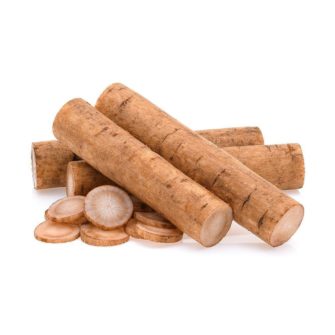Burdock root has been used as food and medicine for centuries in various ways but primarily as a diuretic to aid digestion. It comes from the plant burdock (arctium lappa) that is related to daisies and sunflowers. The roots of the burdock plant are believed to be the most beneficial part of the plant but it can also be take in the form of a tea, dried root powder, oil or extract.
While scientific research that proves burdock’s efficacy is limited, it does contain a variety of nutrients such as antioxidants and inulin that are known to help with conditions like skin disorders, inflammation, digestion, and more. There is little research or guidance on the recommended daily amount of burdock root. Ask your doctor to make sure the dosages of supplements and tinctures are appropriate for your health needs.
You can often find fresh burdock root at natural food stores and farmers’ markets. If eating it, peel the outer layer. You can eat it raw or cooked, such as sauteed or stir-fried. You can also find it as a dried powder, in supplements, or in some skincare products. While burdock root is often eaten, it can also be dried and steeped into a tea. It works well as a source of inulin, a prebiotic fiber that aids digestion and improves gut health.
Burdock Uses
- Reduce Chronic Inflammation
- Slow or Prevent Some Cancers
- Help with Skin Conditions
Side Effects of Burdock
- Increased Dehydration
- Allergic Reaction
- Temporary Bloating
- It is recommended that you only take Burdock in moderation since there is little research on the safety of the supplement.
- Burdock is considered to be safe to eat, but you should only buy it from reputable sellers and should never collect it in the wild. The burdock plant resembles belladonna nightshade plants, which are highly toxic. They often grow together.
- Burdock root is a natural diuretic, so you shouldn’t take it if you’re dehydrated. You also shouldn’t take it if you’re also taking other diuretics or water pills, as it can increase dehydration.
- If you’re allergic to chrysanthemums or daisies, you may be at an increased risk of having an allergic reaction to burdock root and should avoid it.
- Pregnant women or women trying to become pregnant shouldn’t take burdock root or supplements.
Origins of Burdock
Burdock is native to North Asia and Europe, but is grown in other parts of the world, including North America.
My Favorites
- No Favorites Yet

